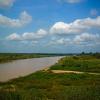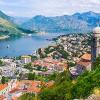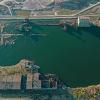Press Releases
Displaying Results 1 - 15 of 15
The Beirut port explosion in August 2020, caused by fire spreading across a storage area detonating a large amount of ammonium nitrate (AN), resulted in 300 deaths and 6,500 injuries, the displacement of about 300,000 people and severe damage to the port and city, including healthcare facilities
Despite decades of discussions on the challenges and intersections between gender and transport, progress has been slow in implementing a gender perspective in transport policies. This has been problematic, for example, in urban planning which fails to recognise the different travel patterns
The COVID-19 pandemic spread around the world at lightning speed, devastating cities and communities and prompting a lockdown. The lockdown period also provided some respite for nature, resulting in memorable sights of ‘nature unlocked’ in our urban habitats.
To immortalize such sights and to
Ghana’s transboundary river basins, namely the Volta River basin (shared with Benin, Burkina Faso, Côte d’Ivoire, Mali and Togo – home to over 23 million people, with a population projected to more than double by 2050), Bia and Tano Rivers (shared with Côte d’Ivoire) and Todzie-Aka basin (shared
Today, European countries adopted the Vienna Declaration to spur the transformation towards clean, safe, healthy and inclusive transport and mobility, with a strong focus on promoting cycling across the pan-European region.
The Vienna Declaration was signed at the end of the Fifth High-level
Since 2018, UNECE has been assisting Montenegro in the implementation of the recommendations from the third Environmental Performance Review (EPR) carried out in 2015.
Since the beginning of the COVID-19 pandemic, activities have been adapted, with funds being redeployed to support the
Countries of the Pan-European region can seize the COVID-19 recovery as a turning point for green and healthy transport and mobility as a foundation to build a better future for all, urges a UN Task Force.
Bringing together over 50 experts from member States, international institutions, academia
Across the world, 153 countries share rivers, lakes and aquifers. Transboundary basins cover more than half of the Earth’s land surface, account for an estimated 60 per cent of global freshwater flow and are home to more than 40 per cent of the world’s population. Transboundary water cooperation is
UN Resident Coordinators based in the countries of Europe and Central Asia have noted that most countries are prioritizing economic recovery during the COVID-19 period and that environmental perspectives are often ignored. The regional interagency Issue-based Coalition on Environment and Climate
The Transport, Health and Environment Pan-European Programme (THE PEP), jointly serviced by the UNECE and the WHO Regional Office for Europe, will hold its Fifth High-Level Meeting from 17 to 18 May 2021. The Fifth High-Level Meeting was due to be held in November 2020 in Vienna; however, due to
The eleventh meeting of the Conference of the Parties to UNECE’s Convention on the Transboundary Effects of Industrial Accidents (Industrial Accidents Convention), drawing to a close today, took place from 7-9 December 2020 – for the first time, in a hybrid form, in view of the COVID-19 pandemic.
For many countries, mining is an important industry in terms of economic and social development. Mining activities however generate hazardous waste that is commonly stored in ponds or tailings, often referred to as tailings management facilities (TMFs). Failures at TMFs have regularly led to
UNECE’s Committee on Environmental Policy adopted the Recommendations of the Third Environmental Performance Review (EPR) of Romania on 10 November 2020. The Third EPR of Romania assessed progress made in the environmental performance of the country since 2012 and made recommendations to
On 2 September 2020, the Compliance Committee to the Convention on Access to Information, Public Participation in Decision-making and Access to Justice in Environmental Matters (Aarhus Convention) adopted a statement on the application of the Aarhus Convention both during the COVID-19 pandemic,
“Sustainable Development Goal 6 on water and sanitation for all is badly off track. This is hindering progress on the 2030 Agenda, the realization of human rights and the achievement of peace and security around the world. Water and sanitation cut across all three pillars of the United












